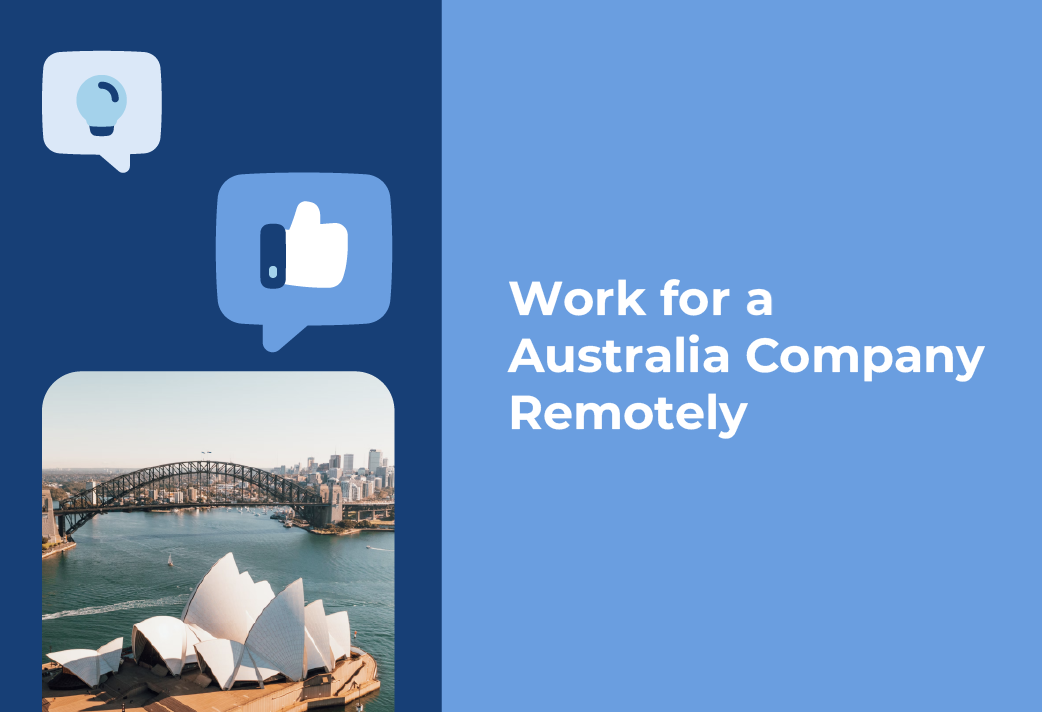If you want to work for an Australian company remotely, today’s digital technologies have revolutionized the workplace and can enable the ability to work for companies across the globe easily and without physical constraints.
Remote work offers flexibility, access to diverse talent pools, and cost savings for employers, making it an increasingly strong option for both parties involved. However, understanding the processes and potential problems is essential. To better help you understand what’s involved, this article will provide a guide on how to effectively work for an Australian company remotely from anywhere in the world.

Tired of scrolling? Download a PDF version for easier offline reading and sharing with coworkers
Can I Work for an Australian Company from Overseas?
Yes, in many cases, you can work for an Australian company remotely from overseas without problems. Today, lots of Australian companies are open to hiring international talent as a way to bring diverse skills and expertise to their projects.
However, several factors must be considered before getting started, including legal requirements, tax obligations, and employment law differences. This is because, wherever you are based, when you work for an Australian company remotely, you may need to comply with both your home country’s and Australia’s employment laws.
Unless the company you are looking to work for already has a company entity in your country, the easiest ways to work for an Australian company remotely are to be hired either as an independent contractor or through an Employer of Record (EOR) service. As an independent contractor, you would need to manage your taxes and benefits independently, and many countries put limits on what contractors can do for a single company.
Alternatively, an EOR service can handle these aspects simply and cost-effectively, ensuring you and the Australian company adhere to all legal requirements without additional hassles.
How do Employer of Record Services Work in Australia?
An Employer of Record (EOR) is a type of third-party organization that offers services which include become the official employer of another company’s workers. In this kind of partnership, the EOR in your working country handles all employment-related tasks, including admin for payroll, taxes, benefits, and compliance with local labor laws.
This kind of comprehensive employment solution allows companies to hire international employees without first establishing a separate business entity in another country.
In overseas countries or Australia, EOR services can manage every part of the employment process, from signing the employment contract and ensuring it meets local legal standards, to handling employee onboarding, payroll processing, tax withholding, superannuation (retirement contributions), and any other legal labor requirements.
For an employee, EOR services offer a a secure employment experience without the doubts and uncertainties of working for a new and less sure entity abroad. Knowing that every element of HR and payroll are professionally managed from day one means each party can focus on their work without concerns around extra admin, overheads, or legal complexities.
Can I Work Remotely for an Australian Company Through an EOR?
Yes, taking the step to work for an Australian company remotely through an EOR is a practical and common approach. In this case, an EOR takes on the legal responsibility of employing workers and ensuring compliance with local laws and regulations, but it can also help with local setup, including managing living expenses and providing support.
This means that remote employees can work for Australian companies remotely in different countries without needing to navigate international employment themselves. The EOR provider thus offers peace of mind and allows you to focus on what’s necessary.
How Much Does Hiring for an Australian Company an EOR Cost?
How much an EOR costs will vary according to the services provided and the country of residence of the employee. EOR services are typically charged on a monthly fee based on a percentage of the employee’s salary, usually ranging from 10% to 20%, depending on the country and the required services.
Some EORs might also charge a flat monthly fee per employee if a company wishes to hire multiple workers at once.
While using an EOR involves its own costs, this structure often proves highly cost-effective when compared to the added expenses and complexities of setting up a new legal entity in a foreign country and ensuring continued compliance with local laws.
Are There Limitations When Working Overseas for an Australian Company Remotely?
While working overseas for an Australian company remotely can open doors to numerous opportunities, there are also limitations and challenges that must be considered.
In particular, legal and tax compliance are significant concerns as both the employee and the employer must adhere to new and often unfamiliar regulations in both the country of residence and Australia. Remote employment like this can involve much more complex tax filings, and thus, understanding bilateral agreements or tax treaties is necessary to avoid high costs or restrictive delays.
Communication and time zone differences can also pose challenges if not properly considered as part of an expansion strategy. Working remotely requires rethinking effective communication strategies that specifically bridge the gap caused by different working hours and cultural differences, such as adapting processes to remote technologies or adopting async working patterns.
What are the Risks of Choosing to Work for an Australian Company Remotely?
Several risks are associated with working remotely for an Australian company, the biggest of which concerns tax compliance. Navigating the tax obligations in both your home country and Australia can be complex, and the potential for mistakes is greatly heightened. Even small mistakes in this respect, especially early on in the expansion process, can result in big fines or legal issues.
As different countries have varying labor laws, ensuring compliance across multiple regulatory systems becomes harder. Misclassification of employment status (e.g., contractor vs. employee) can also lead to legal complications and financial penalties if employers are aware of local differences in classification definitions.
Additionally, ensuring data security and compliance with Australia’s data protection laws is crucial when working remotely, as employees who work for Australian companies remotely may not be aware of Australian data protection requirements in their country of residence.
Cultural differences and communication barriers may also impact your remote work experience or cause employee retention issues. Understanding and adapting to the corporate culture of an Australian company remotely requires effort and effective communication skills.
How Employer of Record Services Can Help Your Company Go Global
In conclusion, taking the chance to work for an Australian company remotely offers numerous opportunities but also comes with specific challenges. Employer of Record services, such as those provided by INS Global, can significantly simplify the processes involved, ensuring total compliance and allowing both companies and employees to benefit from the flexibility and opportunities of remote work.
INS Global’s Employer of Record services offer companies a comprehensive package solution for companies looking to find and hire talent from anywhere around the world. By acting as the legal employer, INS Global handles all employment-related tasks while you get to work for an Australian company remotely, ensuring compliance with local laws and regulations.
In reducing the administrative burden, INS Global provides a seamless and legally compliant employment experience for employer and employee, allowing all parties involved to focus on what matters for the success of a project without worrying about legal and administrative complexities.
To make the most of the growing trend of remote work and drive innovation in an increasingly interconnected world, speak to an INS Global expansion expert today for a free consultation.
FAQs
A Specific Example – Can I Work for an Australian Company from China?
Yes, working for an Australian company while residing in China is entirely possible. However, there are important considerations regarding tax obligations, employment regulations, and compliance requirements for both Australian and Chinese laws.
If hired to work for an Australian company remotely as an independent contractor, you will be required to comply with Chinese tax laws, including self-employment taxes and business registrations. These processes are complex and often misunderstood, with China being less open to foreign workers working under a contractor status than many other countries.
For a simpler solution, an EOR or Professional Employer Organization (PEO) can manage Chinese payroll, taxes, and social security contributions while integrating local payroll with Australian company processes.
Another Specific Example – Can I Live in Australia and Work for a Chinese Company?
Living in Australia and working for a Chinese company is also possible and increasingly common. However, if you choose to work for a Chinese company remotely while residing in Australia, you must be able to clearly determine your tax residency status. Australia taxes worldwide earnings, so you’ll need to report your foreign income to the Australian Taxation Office (ATO). As a result, you might also face double taxation, but China has tax treaties with Australia to mitigate this issue in some cases.


共有